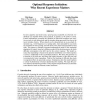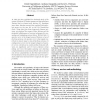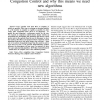1931 search results - page 59 / 387 » Why we blog |
NIPS
2008
13 years 10 months ago
2008
In most cognitive and motor tasks, speed-accuracy tradeoffs are observed: Individuals can respond slowly and accurately, or quickly yet be prone to errors. Control mechanisms gove...
SIROCCO
2007
13 years 10 months ago
2007
Abstract. A large group of autonomous, mobile entities e.g. robots initially placed at some arbitrary node of the graph has to jointly visit all nodes (not necessarily all edges) a...
TNC
2004
13 years 10 months ago
2004
This paper discusses new mobile usage scenarios for WLAN technologies and presents an architecture that is based on the notion of intermittent connectivity instead of seamless con...
USITS
2003
13 years 10 months ago
2003
In 1986 Jim Gray published his landmark study of the causes of failures of Tandem systems and the techniques Tandem used to prevent such failures [6]. Seventeen years later, Inter...
CCR
2006
13 years 8 months ago
2006
Users typically want their flows to complete as quickly as possible: They want a web-page to download quickly, or a file transfer to complete as rapidly as possible. In other words...




